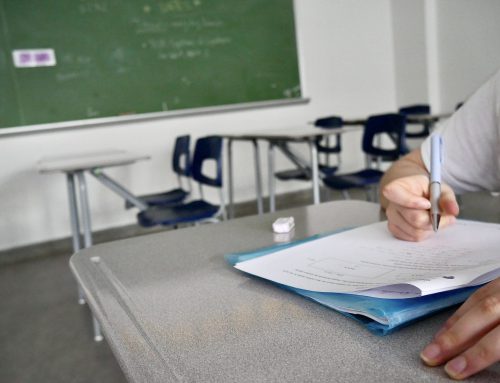BY Olivier Paiement & Jesse Correll
Ukrainian rice, Mexican tacos, and Turkish wedding cake are among many worldwide delicacies served as students from the Carrefour d’aide aux nouveaux arrivants (CANA) celebrate the end of their level five French class.
As the group of eight women sing “Si tous les oiseaux” together, their teacher Rasmane Dawadogo rejoices.
“I am so proud of them. They learned so fast. I have no doubt these wonderful women will be successful in Canada,” he says.

Students from the CANA’s level five class share dishes from around the world to celebrate the end of their course. Photo by Olivier Paiement.
To thank Dawadogo for his work, they give him markers and a notebook.
“He was an amazing teacher. He gave us the confidence to speak and practice,” says Martha Moreno, who moved to Montreal from Mexico City in 2021.
She says she is taking the classes to develop a proficient enough level of French to become a lawyer in Quebec, just like she was in her homeland.
The group spends the next hour talking, joking, and laughing, bonding over the language they now have in common.

Professor Rasmane Sawadogo addresses his level five French class. Photo by Olivier Paiement.
For Moreno, these classes have a strong personal significance. A few months ago, her young daughter visited the hospital after an accident. The mother was refused service in English, despite her limited knowledge of French at the time.
She uses the event as extra motivation in her classes.
“I want to be able to help my daughter when she is being provided services.”
On May 24, 2022, the National Assembly passed Bill 96. The law modified the Charter of the French Language (Law 101) and included a variety of measures aimed to protect the province’s official language.
These notably include a six-month grace period for immigrants to access services in English, and the need for small businesses to declare how many of their employees do not speak French.
Premier Legault claimed there was a decline in the use of French to justify the measures.
According to Statistics Canada, the proportion of francophones in the province went from 81.2 per cent in 2001 to 77.5 per cent in 2021, and from 67.29 to 59.89 per cent in the Greater Montreal area.

The evolution of the different languages most often spoken at home in Montreal. Media by Olivier Paiement.
For Andrew Caddell, the president of the Task Force on Linguistic Policy, a community group suing the government over Bill 96, the flaws behind the law quickly became evident.
“We got more and more stories from people of how the government was deliberately refusing to provide services in English,” he says.
According to Caddell, the emphasis on “historic anglophones” for access to services in English is highly problematic and shows it is more an ethnic than a linguistic issue.
“There is a lack of understanding of who the anglophone community is. This is not 1959 anymore,” he says.
Caddell believes the community’s understanding of language issues in the province, its knowledge of French, and its love for Quebec has grown tremendously over the past few decades.
He adds that the reliance on ethnic barriers to define language issues is troublesome.
There is a generational gap between older and younger Francophones and how they view the language. While they agree French needs to be preserved, how its done is a little more decisive. Video by Jesse Correll.
Another measure taken by the CAQ is a tuition increase for out-of-province students in English Universities.
At McGill and Concordia, Canadian students from outside of Quebec are seeing their tuition increase from $9,000 to $12,000, and international students will need to pay at least $20,000 annually.
The government says it will use this additional funding to help francophone universities.
“It took me four months after signing up on the waiting list to attend my first class. And now, every time I graduate one level, I have to wait six months to get to the next one,” explains Moreno.
For Éric Bouchard, political advisor for Parti Québécois (PQ) MNA Pierre Curzi, the tuition increase is a necessary measure.
“McGill and Concordia are the heart of the anglicization of Montreal,” he says.
When he worked for Curzi, Bouchard conducted a study in 2012 that found that McGill, Concordia, and Bishop’s receive approximately 29 per cent of the funding for the province’s universities.
Considering the English community represents such a small proportion of the population, this means they are overfinanced, he says.
Bouchard believes francophones and allophones are more likely to work in English and abandon French culture after studying in English colleges and universities.
Additionally, McGill and Concordia bring in a large influx of students from outside the province.
“Only 14.1 per cent (5,901) of foreign students who do not speak French took a francization class last year,” he adds, quoting a study by the commissaire à la langue française.
To counter the possible damaging effects of a tuition hike, the universities have proposed increasing the number of students enrolled in French-language programs.
But for recent immigrants, the process of taking French classes is long and complicated. Ever since the program was centralized through Francisation Québec, the waiting lists to attend them have exploded.
“It took me four months after signing up on the waiting list to attend my first class. And now, every time I graduate one level, I have to wait six months to get to the next one,” explains Moreno.
And while Legault and many others pick apart numbers, this can be a risky game to play.
Statistics can be manipulated by either side to favour a point of view, warns Jean-Pierre Corbeil demolinguistics expert and sociology professor at Laval University.
He points to the worries over the statistical decline in francophones, a term used to qualify those for whom French is the language the most spoken at home, since allophones and anglophones can also be fluent in French.
“We hear a lot of people who have not changed their point of view, and who seem to believe Quebec francophonie is reserved for those of French-Canadian descent, or who speak the language at home. And they generally propose exclusionary measures,” he says.
Corbeil recently co-authored the book Le français en déclin? Repenser la francophonie québécoise and offers a more nuanced perspective on the situation.
Although he admits it is important to have measures in place to protect the province’s only official language, he does not believe the issue is as problematic as some let it seem.
“English will always be a part of the environment, especially in Montreal. But speaking another language does not mean you do not care about French,” he says.
He criticizes politicians who overly rely on ethnically driven statistics to attempt to prove the decline in French speakers.
“The state should not have to legislate the language spoken in households. We should take more interest in the use of French in public spaces, such as at school, work, or shops, for instance,” says Corbeil.
In Quebec, the percentage of the population with French knowledge has remained around 94 per cent, for over 30 years. The proportion of immigrants with French knowledge has risen from 53 per cent in the 1970’s to 80 per cent today.

Evolution of French proficiency over the years for Quebec residents and immigrants specifically. Media by Olivier Paiement.
And as politicians continue to fight over linguistic issues, often by attacking certain communities, Moreno impatiently waits, as she should be able to attend her level six class in a few months.
“It is not just about learning French. It is about integration,” she says.
Moreno is not bothered by the political discourse in the province she moved to three years ago and is falling in love with.
She does not feel pressured or under attack, understanding there are more important issues to tackle than statistics.
“At the end of the day, everything is political,” says Moreno.




